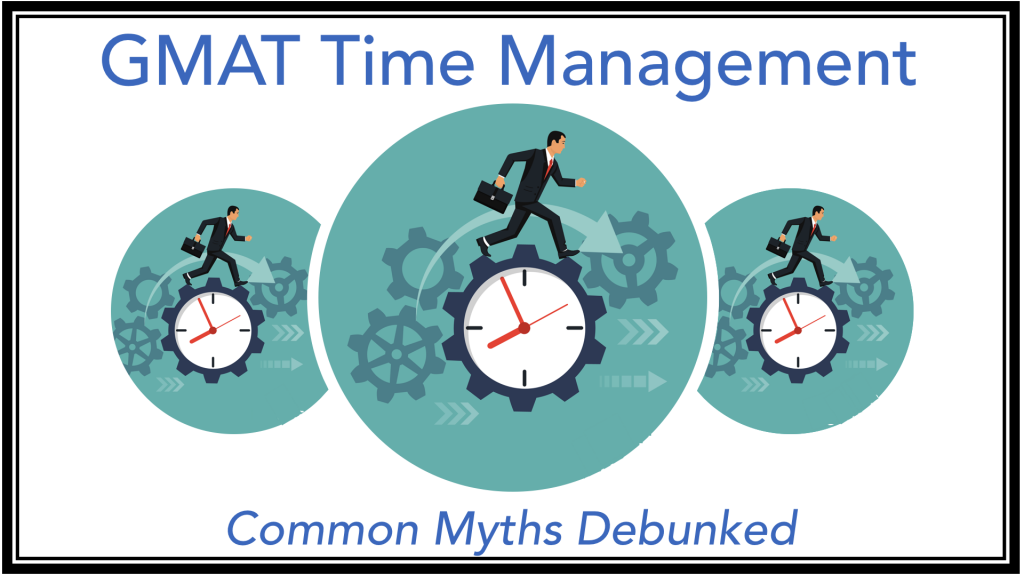A common pattern among the queries we receive related to GMAT Time Management from test takers is:
“I was able to score only X in the GMAT because of a lack of time”
OR
“I wasn’t able to finish the GMAT due to the high difficulty questions appearing in the second half of the test”.
In both the above examples, the lack of time seems to be the main reason behind poor GMAT scores. However, on further analysis, we have determined that a lack of time is seldom the root cause of low GMAT scores. The adaptive nature of the GMAT and its focus on testing ability over accuracy has given rise to many myths related to time management on the test. These myths can mislead you to focus on the wrong things during preparation and impact your GMAT score negatively.
In this article, we will debunk the following myths:
- Spending too much time on the first 10 questions
- Spending extra time in solving difficult questions
- Regardless of sub-section, every question must be solved in the same amount of time
- Not skipping a few difficult questions due to lack of time

Myth 1:
Spending too much time in attempting the first 10 questions
We have seen in our previous article about the adaptive nature of the GMAT, the test has a pretty good estimate of your ability based on your responses to the first 20 odd questions. However, if you are spending more than 70%-80% of your Takt time in just the approach to solving the first few questions, there is a high probability of not finishing the test. As this leads to less than adequate time to answer the remaining questions. Moreover, as not finishing the test is penalized heavily. the extra time spent in answering the initial questions can result in poor scores if you are not able to attempt all questions.
Thus, while it is important to answer the initial questions correctly, it is equally important to finish the test.
The knowledge of your Takt time, for different sub sections, helps you in keeping track of your progress through the test. Read this article to learn more about how to determine your Takt time and improve your GMAT score.
Myth 2:
Spending an unreasonably high amount of time in solving difficult/unanswerable questions
A common mistake made by students in the GMAT exam is spending more time on questions which they find difficult. Thinking that answering such questions is worth the extra time investment is a fallacy due to an incomplete understanding of the testing algorithm.
The argument made by test takers is that since the GMAT has presented me with a harder question, my ability score will improve if I answer a difficult/unanswerable question correctly. While this may seem logical at the outset, spending more time than usual on any question, invariably leads to not having enough time to solve all the questions in a section. There can be one of two outcomes to this:
- You guess the answers to the last few questions which you could have otherwise solved correctly
- You are not able to attempt the last few questions
First, despite all the additional time spent on the set of difficult questions, chances are high that response to those questions may still be incorrect. Secondly, if you had enough time saved on such questions, you could have utilized it to solve some of the last questions correctly. Third and the most important part to note here is that the second outcome, is in fact, very heavily penalized by the GMAT scoring algorithm – it may result in almost a 14 percentile drop).
This can be evidenced in the analysis of the GMAT Prep Software. This analysis is conducted on the official GMAT Prep tests provided by the GMAC, which are the closest in terms of the scoring algorithm to the actual GMAT.
Myth 3:

Spending equal time regardless of sub-section on each question
Many test takers wrongly conclude that if all questions are of equal importance, then one should take the same amount of time in answering any question.
The inherent assumption in arriving at this conclusion is that all questions are of equal difficulty. Remember, the GMAT is a question adaptive test. And the difficulty level of your next question depends on your response to the previous question.
Moreover, there is a lot of difference between the questions asked in different sub-sections. Thus a reading comprehension based question cannot be solved in the same amount of time as a sentence correction question. Similarly, the process for solving data sufficiency based questions in quant is different as compared to the process of solving problem-solving questions. And hence, each question takes a different amount of time in being solved correctly.
In an adaptive test like the GMAT, the only time that matters is the time you take to answer questions correctly.
Thus, a strategy which focuses on solving each question in an equal amount would result in allocating equal time for questions of all difficulties. Such a strategy is bound to affect your accuracy as well as ability, which in turn will affect your GMAT score.
Read how a test taker scored a 750 by focusing on ability rather than timing.
Myth 4:
Not Skipping a few difficult questions because of lack of time
The GMAT heavily penalizes not finishing a test. As evidenced by the analysis of GMAT prep software here.
In the analysis, the following 2 scenarios were examined:
Scenario A: The first 30 questions are answered correctly, and the remaining 7 questions are answered incorrectly.
Scenario B: The first 30 questions are answered incorrectly, and the remaining 7 questions are not answered at all (due to running out of time)
The result of the attempt in scenario A is a Q50 (corresponding to 92 percentile) vs. Q45 (corresponding to 71 percentile).
Thus, the key takeaway here is that if you are running short of time and must choose between answering difficult questions from your weak area, or possibly not completing the test. Or skipping the difficult question to ensure that you complete the test and mark all answers, the latter is not penalized as much as the former.
Learn how Alok scored a 740 in GMAT by applying the skipping strategy
Now that you know about the things you should not do in the test, read our article on GMAT time management strategies. It covers the best time management practices that lead to higher scores on the GMAT. As always, in case of any other questions, please write to us at acethegmat@e-gmat.com
If you are planning to take the GMAT, we can help you with a personalized study plan and give you access to quality online content to prepare. Write to us at acethegmat@e-gmat.com. We are the most reviewed GMAT prep company on GMAT club with more than 2400 reviews and are the only prep company that has delivered more than 700+ scores than any other GMAT club partner. Why don’t you take a free trial and judge for yourself?














